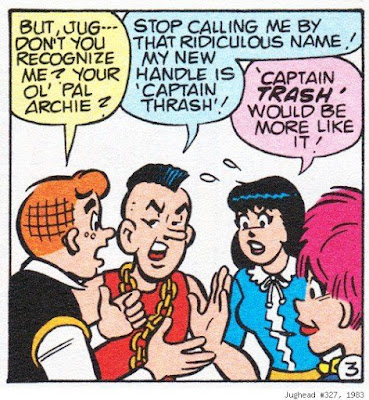REAGAN YOUTH OR "WE'RE NOT HERE TO ENTERTAIN: PUNK ROCK, RONALD REAGAN, AND THE REAL COUNTERCULTURE OF 1980s AMERICA"
Damn, did I want to love this.
I can't remember where I heard about "We're Not Here to Entertain," but it got a good review from "Kirkus"or "Library Journal," and the cover had Henry Rollins screaming into Ronald Reagan's dumb face. I loved the idea of a book examining the political aspect of the early American hardcore movement, an aspect which can be undersold. So I ordered it sight unseen and readily dove in.
I don't know when I've read a book with more easy-to-spot errors. Just a few: John Belushi was famous for Saturday Night Live before he was in "Animal House." The Florida band with the kick-ass song "Communist Radio" was the Eat, not the Eats. The logo Alternative Tentacles put on their cassette releases was a cassette over a crossbones, not a cartoon pirate. E.T. loved Reese's Pieces, not Pez. Also, E.T. has periods after each letter, as it's an abbreviation. Vets is not capitalized. Tim Yohannan is called Tim Yo throughout the book with no transition or explanation, writer Mikal Gilmore is introduced at least twice by referring to his brother Gary Gilmore, and we really don't need a summary of the plot of "E.T."
These led me to more fact-checking than reading. Did Clint Eastwood say "Make my day" in "Sudden Impact" or another movie? Did Nicolas Cage really punch the rich guy at the end of "Valley Girl?" In both cases, the author was correct, but why was I doing his research for him?
And it's a shame because the author Kevin Mattson was a cofounding member of Positive Force D.C., a punk political activism collective in the nation's capital. If this dude can't get it right, who can?
Mattson shines when it comes to the actual politics and the grim underside of American life in the '80s. Punk rockers were correct in thinking Reagan was an asshole, and while time and subsequent presidents have softened his image, it's important to remember just how assholish he could be (Talking about "state's rights" while kicking off a campaign in Philadelphia, Mississippi where civil rights workers were murdered decades before is less of a dog whistle and more of a foghorn).
There's also a great quote where Reagan rails against the "underground economy...the friendly neighborhood fix-it-man, a mechanic, craftsman (who) ...prefer to be paid in cash. The underground economy is a kind of cash-and-carry barter system - no checks, no records or bookkeepping, and thus, no tax." Funny how he was pissed at mechanics and craftsmen for not paying taxes while turning a blind eye to his rich asshole friends.
I could go on for paragraphs about Ronald Reagan being an asshole, and Mattson uses him as an easy villain (as he was at the time - there were tons of anti-Reagan flyers and songs) and it works. The above quote is contrasted several times with the underground's "potlach culture," in which punks traded zines, gave away records, and assisted others with information and resources. I don't really think that's what potlach culture means (I remember it having something to do with Northwestern Native American tribes destroying or giving away their possessions as a way to show status, but I've already had to look up the plots to "Valley Girl" and "Sudden Impact," and that seemed like too much fact-checking for a night.), but it effectively contrasts the two cultures.
Mattson also spotlights punk artists, zine makers, and filmmakers which is interesting and welcome, as these artists don't get as much press as the bands. In fact, there's an amazing story in which the editor of a fanzine named "Destroy LA" was interviewed by the Feds and ordered to change the name and apologize to the Postmaster General. Again, this was the '80s, not 1918.
Punk political protest is covered well in sections on the Rock against Reagan tour and the protests in San Francisco at the Democratic Party Convention, but strangely for a writer in D.C., not much on Revolution Summer and the Punk Percussion Protest. Actually, that would have been Bush senior, so I guess it's out of his focused era. Wait, why am I fact-checking again?
Mattson really seems to have a thing against media punk exploitation as seen in "Valley Girl," "Class of 1984," and those episodes of "Quincy" and "CHiPs," which is unfortunate, as most thinking people acknowledge that these things are awesome.
I suppose a casual music history fan or reader interested in the '80s American social/political scene would find "We're Not Here to Entertain," interesting, but readers with more grounding in either (unless they want to brush up on the plot to "E.T.") will probably be frustrated.
Buy, Borrow from the Library, or Pass
Borrow or Pass. If you borrow, however, realize that you've just signed up for a fact-checking internship.



Comments
Post a Comment